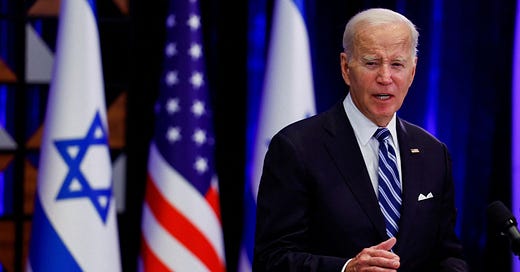Is Biden Stirring the Middle East Pot?
In the landscape of Middle Eastern geopolitics, President Biden just pledged $100 million in aid to Palestine. And it has ignited a swarm of concerns. The optics of this aid, critics argue, portray an administration attempting to straddle a delicate line, potentially aggravating an already precarious situation. Amidst the simmering tensions, Iran's stance and the potential involvement of Hezbollah from Lebanon threaten to escalate the regional discord into a full-blown two-front confrontation with Israel.
Fuelling a Double-Edged Sword:
The humanitarian aid, directed towards ameliorating the crisis in Gaza and the West Bank, comes amid heightened tensions following a deadly attack by Hamas and the subsequent Israeli military retaliation. Critics assert that funneling funds into a volatile region, sans stringent oversight, is akin to fuelling a perilous cycle of conflict. Despite assurances from the Biden administration concerning mechanisms to prevent aid misuse, the feasibility of such controls in a conflict-ridden zone remains dubious.
Undermining Israel’s Security:
Post a solidarity visit to Israel, extending aid to Palestine could be perceived as undermining Israel's security concerns. This aid package's timing, in the aftermath of a Hamas-led attack and Israeli military reprisal, sketches a narrative of a U.S. administration attempting to balance humanitarian concerns against political allegiance, risking Israel's ire in the process.
GOP’s Scathing Critique:
The GOP has castigated this move as a potential misstep that could inadvertently finance further conflict in the region. They highlight the fine line between humanitarian aid and financing terrorism, especially given Hamas's animosity towards Israel. This aid, they contend, could embolden Hamas and other hostile factions within Palestine.
A Divisive Signal to Middle Eastern Allies:
This aid package sends mixed signals to other Middle Eastern allies regarding the U.S.'s stance in the region, possibly straining relations and complicating the U.S.'s position in the Middle Eastern geopolitical tableau.
Igniting Protests and Further Unrest:
The aid announcement unfolds against a backdrop of widespread protests across several Middle Eastern countries. This financial bolstering of Palestine could be construed as the U.S. taking sides in an entrenched conflict, potentially fuelling further unrest and anti-American sentiment in an already tense region.
Iran, Hezbollah, and the Threat of a Two-Front War:
Iran's foreign minister has admonished Israel to cease its attacks on Gaza, hinting at a broader conflict if Hezbollah gets embroiled, which could shake Israel to its core. Moreover, Hezbollah, backed by Iran, has significantly honed its military capabilities over the years, posing a formidable threat to Israel from the north. There are growing apprehensions that Iran, through its proxy Hezbollah, aims to drag Israel into a two-front war, escalating the conflict to a perilous level.
A Glimpse into a Two-Front War:
The threat of a two-front war is not to be taken lightly. Such a scenario would stretch Israel's military capabilities, as it would need to defend and possibly counterattack on both its northern and southern borders. It's a situation that would likely escalate violence across the region.
In the north, skirmishes with Hezbollah, a well-armed faction with significant firepower including a stockpile of missiles, could quickly escalate into a full-blown conflict. The terrain in the north is mountainous and heavily forested, making military operations complex and challenging.
Meanwhile, to the south, the ongoing tensions with Palestinian factions in Gaza could escalate, with a potential uptick in rocket attacks and other hostile activities. The densely populated areas in and around Gaza make military engagements particularly hazardous, with a high risk of civilian casualties.
This potential escalation on two fronts would not only pose significant security challenges for Israel but could also draw in other regional players, further complicating the geopolitical landscape. The ripple effects would likely reverberate throughout the Middle East, possibly pulling in other nations into the fray, and could significantly strain U.S. relations and interests in the region.
Conclusion:
While the humanitarian intent behind the aid is commendable, the timing and optics of this move are contentious. Coupled with Iran's stance and Hezbollah's potential involvement, the decision could catalyze further unrest, placing an already volatile region on a tighter knife-edge of conflict. This intricate situation leaves policymakers and observers with a complex puzzle to unravel as they navigate the confusing geopolitics of the Middle East, where every move reverberates through a powder keg of simmering tensions and longstanding grievances.




